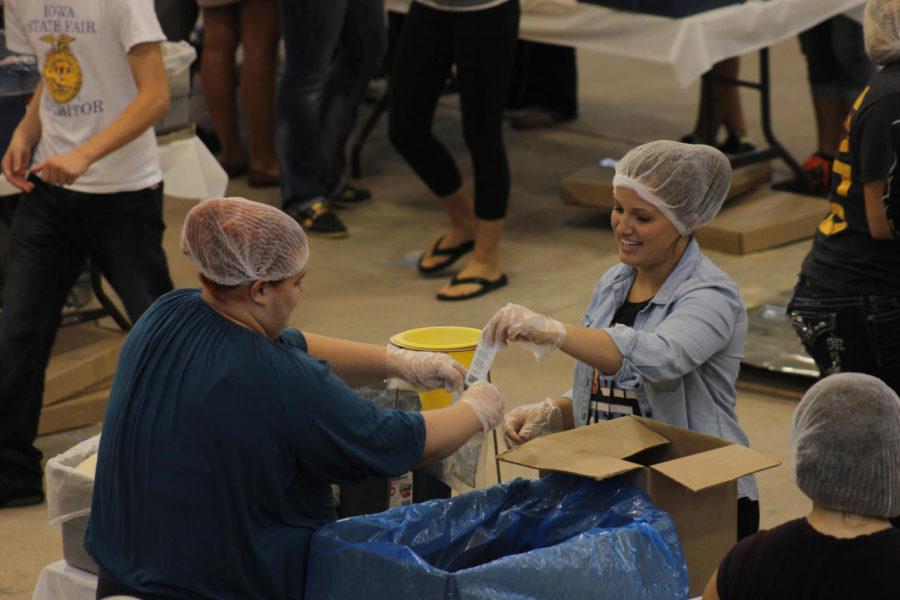Block and Bridle Hunger Fight exceeds expectations with number of meals made
Korrie Bysted/Iowa State Daily
Students help pack bags of food at the Block and Bridle Hunger Fight philanthropy on Tuesday in the Kildee Hall pavilion.
October 1, 2014
The ISU Block and Bridle Club fought hunger by celebrating agriculture.
The club held the first on-campus first Hunger Fight Tuesday in the Kildee Hall Farm Pavilion in partnership with Meals from the Heartland — a meal-packing organization based in West Des Moines that delivers meals to malnourished families in the United States and around the world.
About 370 students, staff, faculty and community members volunteered at the CALS Week event to make 60,264 meals in less than five hours.
“It was amazing,” said Lexi Marek, Block and Bridle philanthropy co-chair and sophomore in public service and administration in agriculture.
Of those meals, 10 percent will be delivered to Iowans. The remaining 90 percent will be distributed to those in need in the United States, Ghana, Haiti, the Philippines and other areas.
Shelby Patten, Block and Bridle philanthropy co-chair, said the Hunger Fight was a big part of the CALS Week mission.
“One of the huge missions of the College of Agriculture and Life Sciences is figuring out ways to feed the growing population of people and help minimize world hunger,” Patten said. “It was a huge motivation of what we were doing today.”
Patten, junior in dairy science, said students can use their studies to make a difference in the world.
“One of our goals is going to school is trying to come up with ways to come up with more food more efficiently,” Patten said.
Volunteers stood in an assembly line to pack meals made of dried veggies, rice, a vitamin packet and a specially-formulated soy protein.
Each packaged meal contains up to six servings. Recipients boil the content in water to cook the food.
The protein in the soy mixture helps maintain muscle mass that easily deteriorates when a person goes hungry for a period of time, Marek said.
“That [protein] is saving people’s lives,” Marek said.
Each volunteer wore a hairnet, sanitized their hands and put on gloves before packaging the food.
Every product used at the event — the food, boxes and bags — came from the midwest, Marek said.
The cost of the whole event was about $10,000, which makes the average cost per each meal made about $.17.
Meals from the Heartland, which was established in 2008, had a goal to make 10 million meals this year, Marek said.
Before the Block and Bridle event, the organization had about 8 million packaged.
“We got to help them meet their goal,” Marek said. “It was pretty awesome.”
Marek said she was grateful for the amount of campus participation.
“I was so overwhelmed,” she said. “It was truly amazing. It was one of the most rewarding things I’ve ever done.”
Patten said she enjoyed the atmosphere of the event.
“Seeing so many people so excited to help save the world and help feed others was pretty rewarding,” Patten said.
Patten didn’t know if there would be a Hunger Fight on campus next year, but said she would like to see a new tradition established.
Marek also said the volunteers involved seemed happy with the event.
“It was fun. They were making a difference. They were helping,” Marek said. “A lot of students are involved in agriculture, but this is one way they could reach out and make a difference.”

















